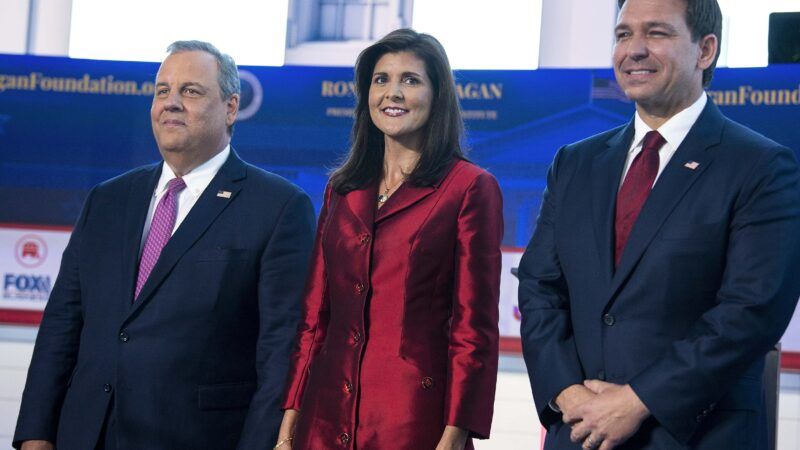Ron DeSantis and Chris Christie Call Out Trump for Adding to Federal Debt
"He owes it to you to defend his record where they added $7.8 trillion to the debt that set the stage for the inflation that we have."

At the first Republican presidential primary debate last month, former South Carolina Gov. Nikki Haley stood out for quickly calling out former President Donald Trump for adding nearly $8 trillion to the national debt during his four years in office.
A few of her competitors for the nomination took notice.
Within the first 10 minutes of Wednesday's second GOP debate, both former New Jersey Gov. Chris Christie and current Florida Gov. Ron DeSantis pointedly criticized Trump for adding to the national debt—and for declining to show up Wednesday to defend his record.
In response to a question about whom voters ought to blame in the event of a government shutdown, Christie said everyone in D.C. for the past few years deserves scorn.
"And let's be honest about this with the voters: During the Trump administration they added $7 trillion in national debt. And now the Biden administration has put another $5 trillion and counting," Christie said. "None of them are willing to take on the difficult issues. They just want to keep kicking the can down the road."
Moments later, DeSantis jumped in to make the same point.
"Donald Trump is missing in action. He should be on this stage tonight. He owes it to you to defend his record where they added $7.8 trillion to the debt that set the stage for the inflation that we have," DeSantis said. "As your president, when they send me a bloating [sic] spending bill that's going to cause your prices to go up, I'm going to take out this veto pen, and I'm going to send it right back to them."
It seems obvious that both candidates noticed how Haley got a significant bump in the polls following her strong performance in the first debate and decided to borrow from her highlight reel.
It's a clean hit on Trump, the GOP frontrunner. During Trump's four years in office, the national debt climbed from about $20 trillion to nearly $28 trillion. Today, it stands at $33.1 trillion—incredibly, that's roughly $400 billion higher than it was during the first Republican debate held just 35 days ago.
The bills racked up by Biden and Trump (and former Presidents Barack Obama and George W. Bush, for that matter) are now coming due. Much of that borrowing occurred when interest rates were significantly lower than they are today, but rising interest rates have compounded the annual payments on the debt. According to the Committee for a Responsible Federal Budget, interest costs will exceed military spending within the next two years, under current interest rates, and will become "the single largest government program in just two decades."
That looming crisis perhaps explains the increasing willingness of the Republican field to call out Trump's record—and the record of Republican lawmakers in Congress, most of whom voted for those spending increases and the borrowing they require. It's a significant development, if only because talking about the threat that reckless federal borrowing poses to the country is a necessary first step toward getting the deficit under control.
Of course, we should not be naive enough to confuse campaign trail talk—to say nothing of debate stage bluster—for an actual commitment to dealing with the debt. And, as it was for Haley a month ago, this is a convenient way for candidates like DeSantis and Christie to draw a distinction between themselves and their rivals who have played a role in passing recent federal budgets.
The Republican Party has a lot of work to do to reclaim its place as the party of fiscal responsibility. But if the GOP's would-be leaders keep talking like this, it might eventually get there.


Show Comments (15)